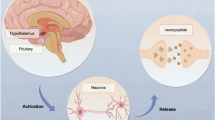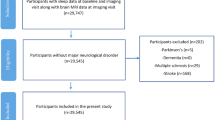Abstract
Melatonin, a neuro-differentiation factor, may play a role in the neurodevelopmental origins of schizophrenia. Cognitive impairment and decreased melatonin are reported in schizophrenia; however, the relationship between them remains unclear. We hypothesised that patients with schizophrenia would have lower concentrations of circulating melatonin than healthy controls and that melatonin levels would be associated with cognitive impairment. This study included 47 patients with schizophrenia and 40 healthy controls (HC). Serum melatonin concentrations were measured using the enzyme-linked immunosorbent assay. Positive and Negative Syndrome Scales (PANSS), The Morningness-Eveningness Questionnaire (MEQ), Pittsburgh Sleep Quality Index (PSQI), the Stroop and Oktem verbal memory processes (VMPT) tests were applied. Patients with schizophrenia had lower levels of melatonin compared to the HC group (p = 0.016), also after controlling for age, sex, and body mass index (BMI) (p = 0.024). In patients with schizophrenia, melatonin concentrations were associated with higher BMI (rho = 0.34, p = 0.01) and lower MEQ score (rho = −0.29, p = 0.035). The patient sample was split into low and high melatonin categories by using the median melatonin concentration in HC as the cut-off. Patients in the low melatonin group had poorer performance in VMPT-Recognition (p = 0.026) and Stroop-Colour Error (p = 0.032). Notwithstanding its limitations, the findings of this exploratory study suggest that decreased serum melatonin concentrations observed in schizophrenia might also be associated with cognitive impairment and circadian preferences. Future studies are required to investigate the role of melatonergic pathways in patients with schizophrenia.

Similar content being viewed by others
References
Afonso P, Brissos S, Figueira ML, Paiva T (2010) Discrepant nocturnal melatonin levels in monozygotic twins discordant for schizophrenia and its impact on sleep. Schizophr Res 120:227–228. https://doi.org/10.1016/j.schres.2010.03.031
Afonso P, Figueira ML, Paiva T (2011) Sleep-promoting action of the endogenous melatonin in schizophrenia compared to healthy controls. Int J Psychiatry Clin Pract 15:311–315. https://doi.org/10.3109/13651501.2011.605954
Aleman A, Hijman R, de Haan EH, Kahn RS (1999) Memory impairment in schizophrenia: a meta-analysis. Am J Psychiatry 156:1358–1366 https://doi.org/10.1176/ajp.156.9.1358
Anderson G, Maes M (2012) Melatonin: an overlooked factor in schizophrenia and in the inhibition of anti-psychotic side effects. Metab Brain Dis 27:113–119. https://doi.org/10.1007/s11011-012-9307-9
Balikci K, Aydin O, Tas C, Esen Danaci A (2018) Oxytocin and social cognition in patients with schizophrenia: comparison with healthy siblings and healthy controls. Psychiatry and Clinical Psychopharmacology 28:123–130. https://doi.org/10.1080/24750573.2017.1387405
Beckmann H, Wetterberg L, Gattaz WF (1984) Melatonin immunoreactivity in cerebrospinal fluid of schizophrenic patients and healthy controls. Psychiatry Res 11:107–110
Benloucif S, Burgess HJ, Klerman EB, Lewy AJ, Middleton B, Murphy PJ, Parry BL, Revell VL (2008) Measuring melatonin in humans. J Clinical Sleep Med: JCSM : Official Publication American Academy Sleep Med 4:66–69
Bersani G, Garavini A, Iannitelli A, Quartini A, Nordio M, Di Biasi C, Pancheri P (2002) Reduced pineal volume in male patients with schizophrenia: no relationship to clinical features of the illness. Neurosci Lett 329:246–248
Bersani G, Mameli M, Garavini A, Pancheri P, Nordio M (2003) Reduction of night/day difference in melatonin blood levels as a possible disease-related index in schizophrenia. Neuro Endocrinol Lett 24:181–184
Bromundt V, Koster M, Georgiev-Kill A, Opwis K, Wirz-Justice A, Stoppe G, Cajochen C (2011) Sleep-wake cycles and cognitive functioning in schizophrenia. Br J Psychiatry 198:269–276. https://doi.org/10.1192/bjp.bp.110.078022
Bruno A, Zoccali RA, Abenavoli E, Pandolfo G, Scimeca G, Spina E, Muscatello MR (2014) Augmentation of clozapine with agomelatine in partial-responder schizophrenia: a 16-week, open-label, uncontrolled pilot study. J Clin Psychopharmacol 34:491–494. https://doi.org/10.1097/jcp.0000000000000157
Buysse DJ, Reynolds CF, 3rd, Monk TH, Berman SR, Kupfer DJ (1989) The Pittsburgh sleep quality index: a new instrument for psychiatric practice and research. Psychiatry Res 28:193–213
Cercos MG, Galvan-Arrieta T, Valdes-Tovar M, Solis-Chagoyan H, Argueta J, Benitez-King G, Trueta C (2017) Abnormally increased secretion in olfactory neuronal precursors from a case of schizophrenia is modulated by melatonin: a pilot study. Int J Mol Sci 18. https://doi.org/10.3390/ijms18071439
De Berardis D et al (2015) Agomelatine beyond borders: current evidences of its efficacy in disorders other than major depression. Int J Mol Sci 16:1111–1130. https://doi.org/10.3390/ijms16011111
Fanget F, Claustrat B, Dalery J, Brun J, Terra JL, Marie-Cardine M, Guyotat J (1989) Nocturnal plasma melatonin levels in schizophrenic patients. Biol Psychiatry 25:499–501
Findikli E, Inci MF, Gokce M, Findikli HA, Altun H, Karaaslan MF (2015) Pineal gland volume in schizophrenia and mood disorders. Psychiatr Danub 27:153–158
Galvan-Arrieta T et al (2017) The role of melatonin in the neurodevelopmental etiology of schizophrenia: a study in human olfactory neuronal precursors. J Pineal Res 63. https://doi.org/10.1111/jpi.12421
Gupta M (2010) Depression in systemic lupus erythematosus: a systematic review. Indian J Psychiatry 52:21–27. https://doi.org/10.4103/2321-6662.210493
Horne JA, Ostberg O (1976) A self-assessment questionnaire to determine morningness-eveningness in human circadian rhythms. Int J Chronobiol 4:97–110
Jiang HK, Wang JY (1998) Diurnal melatonin and cortisol secretion profiles in medicated schizophrenic patients. J Formos Med Assoc 97:830–837
Kamath A, Rather ZA (2018) Melatonin for atypical antipsychotic-induced metabolic adverse effects: a meta-analysis of randomized controlled trials. Biomed Res Int 2018:8–8. https://doi.org/10.1155/2018/4907264
Kanne SM, Balota DA, Spieler DH, Faust ME (1998) Explorations of Cohen, Dunbar, and McClelland's (1990) connectionist model of Stroop performance. Psychol Rev 105:174–187
Krystal AD, Thakur M, Roth T (2008) Sleep disturbance in psychiatric disorders: effects on function and quality of life in mood disorders, alcoholism, and schizophrenia. Ann Clin Psychiatry 20:39–46. https://doi.org/10.1080/10401230701844661
Larson J, Jessen RE, Uz T, Arslan AD, Kurtuncu M, Imbesi M, Manev H (2006) Impaired hippocampal long-term potentiation in melatonin MT2 receptor-deficient mice. Neurosci Lett 393:23–26. https://doi.org/10.1016/j.neulet.2005.09.040
Liebrich LS, Schredl M, Findeisen P, Groden C, Bumb JM, Nolte IS (2014) Morphology and function: MR pineal volume and melatonin level in human saliva are correlated. J Magn Reson Imaging 40:966–971. https://doi.org/10.1002/jmri.24449
Mann K et al (2006) Nocturnal hormone profiles in patients with schizophrenia treated with olanzapine. Psychoneuroendocrinology 31:256–264. https://doi.org/10.1016/j.psyneuen.2005.08.005
Manoach DS, Pan JQ, Purcell SM, Stickgold R (2016) Reduced sleep spindles in schizophrenia: a treatable Endophenotype that links risk genes to impaired cognition? Biol Psychiatry 80:599–608. https://doi.org/10.1016/j.biopsych.2015.10.003
Miller CL, Llenos IC, Dulay JR, Weis S (2006) Upregulation of the initiating step of the kynurenine pathway in postmortem anterior cingulate cortex from individuals with schizophrenia and bipolar disorder. Brain Res 1073-1074:25–37. https://doi.org/10.1016/j.brainres.2005.12.056
Modabbernia A, Heidari P, Soleimani R, Sobhani A, Roshan ZA, Taslimi S, Ashrafi M, Modabbernia MJ (2014) Melatonin for prevention of metabolic side-effects of olanzapine in patients with first-episode schizophrenia: randomized double-blind placebo-controlled study. J Psychiatr Res 53:133–140. https://doi.org/10.1016/j.jpsychires.2014.02.013
Monteleone P, Maj M, Fusco M, Kemali D, Reiter RJ (1992) Depressed nocturnal plasma melatonin levels in drug-free paranoid schizophrenics. Schizophr Res 7:77–84
Monteleone P, Natale M, La Rocca A, Maj M (1997) Decreased nocturnal secretion of melatonin in drug-free schizophrenics: no change after subchronic treatment with antipsychotics. Neuropsychobiology 36:159–163. https://doi.org/10.1159/000119377
Monti JM, BaHammam AS, Pandi-Perumal SR, Bromundt V, Spence DW, Cardinali DP, Brown GM (2013) Sleep and circadian rhythm dysregulation in schizophrenia. Prog Neuro-Psychopharmacol Biol Psychiatry 43:209–216. https://doi.org/10.1016/j.pnpbp.2012.12.021
Morera-Fumero AL, Abreu-Gonzalez P (2013) Role of melatonin in schizophrenia. Int J Mol Sci 14:9037–9050. https://doi.org/10.3390/ijms14059037
Morera-Fumero AL, Abreu-Gonzalez P, Henry-Benitez M, Diaz-Mesa E, Yelmo-Cruz S, Gracia-Marco R (2013) Chronotype as modulator of morning serum melatonin levels. Actas Esp Psiquiatr 41:149–153
Naismith SL, Hermens DF, Ip TK, Bolitho S, Scott E, Rogers NL, Hickie IB (2012) Circadian profiles in young people during the early stages of affective disorder. Transl Psychiatry 2:e123. https://doi.org/10.1038/tp.2012.47
Oktem O (1992) A verbal test of memory processes: a preliminary study. Archives of Neuropsychiatry 29:196–206
Palmese LB, DeGeorge PC, Ratliff JC, Srihari VH, Wexler BE, Krystal AD, Tek C (2011) Insomnia is frequent in schizophrenia and associated with night eating and obesity. Schizophr Res 133:238–243. https://doi.org/10.1016/j.schres.2011.07.030
Pocivavsek A, Rowland LM (2018) Basic neuroscience illuminates causal relationship between sleep and memory: translating to schizophrenia. Schizophr Bull 44:7–14. https://doi.org/10.1093/schbul/sbx151
Punduk Z, Gur, H, Ercan I (2005) A reliability study of the Turkish version of the mornings-evenings questionnaire Turk Psikiyatri Derg 16:40–45
Ragland JD, Ranganath C, Harms MP, Barch DM, Gold JM, Layher E, Lesh TA, MacDonald AW III, Niendam TA, Phillips J, Silverstein SM, Yonelinas AP, Carter CS (2015) Functional and neuroanatomic specificity of episodic memory dysfunction in schizophrenia: a functional magnetic resonance imaging study of the relational and item-specific encoding task. JAMA Psychiatry 72:909–916. https://doi.org/10.1001/jamapsychiatry.2015.0276
Rao ML, Gross G, Strebel B, Braunig P, Huber G, Klosterkotter J (1990) Serum amino acids, central monoamines, and hormones in drug-naive, drug-free, and neuroleptic-treated schizophrenic patients and healthy subjects. Psychiatry Res 34:243–257
Rao ML, Gross G, Strebel B, Halaris A, Huber G, Braunig P, Marler M (1994) Circadian rhythm of tryptophan, serotonin, melatonin, and pituitary hormones in schizophrenia. Biol Psychiatry 35:151–163
Rawashdeh O, de Borsetti NH, Roman G, Cahill GM (2007) Melatonin suppresses nighttime memory formation in zebrafish. Science 318:1144–1146. https://doi.org/10.1126/science.1148564
Rimmele U, Spillmann M, Bartschi C, Wolf OT, Weber CS, Ehlert U, Wirtz PH (2009) Melatonin improves memory acquisition under stress independent of stress hormone release. Psychopharmacology 202:663–672. https://doi.org/10.1007/s00213-008-1344-z
Robillard R, Rogers NL, Whitwell BG, Lambert T (2012) Are cardiometabolic and endocrine abnormalities linked to sleep difficulties in schizophrenia? A hypothesis driven review Clin Psychopharmacol Neurosci 10:1–12. https://doi.org/10.9758/cpn.2012.10.1.1
Robinson S, Rosca P, Durst R, Shai U, Ghinea C, Schmidt U, Nir I (1991) Serum melatonin levels in schizophrenic and schizoaffective hospitalized patients. Acta Psychiatr Scand 84:221–224
Ryan MC, Flanagan S, Kinsella U, Keeling F, Thakore JH (2004) The effects of atypical antipsychotics on visceral fat distribution in first episode, drug-naive patients with schizophrenia. Life Sci 74:1999–2008. https://doi.org/10.1016/j.lfs.2003.08.044
Sandyk R, Kay SR (1991) Pineal calcification in schizophrenia. Relationship to age of onset and tardive dyskinesia. Schizophr Res 5:85–86
Smith JA, Mee TJ, Barnes JL (1977) Elevated melatonin serum concentrations in psychiatric patients treated with chlorpromazine. J Pharm Pharmacol 29:30P–30P
Smith JA, Mee TJ, Padwick DJ, Spokes EG (1981) Human post-mortem pineal enzyme activity. Clin Endocrinol 14:75–81
Suresh Kumar PN, Andrade C, Bhakta SG, Singh NM (2007) Melatonin in schizophrenic outpatients with insomnia: a double-blind, placebo-controlled study. J Clin Psychiatry 68:237–241
Tek C, Palmese LB, Krystal AD, Srihari VH, DeGeorge PC, Reutenauer EL, Guloksuz S (2014) The impact of eszopiclone on sleep and cognition in patients with schizophrenia and insomnia: a double-blind, randomized, placebo-controlled trial. Schizophr Res 160:180–185. https://doi.org/10.1016/j.schres.2014.10.002
Thakore JH, Mann JN, Vlahos I, Martin A, Reznek R (2002) Increased visceral fat distribution in drug-naive and drug-free patients with schizophrenia. Int J Obes Relat Metab Disord 26:137–141. https://doi.org/10.1038/sj.ijo.0801840
Tripathi A, Kar SK, Shukla R (2018) Cognitive deficits in schizophrenia: understanding the biological correlates and remediation strategies. Clin Psychopharmacol Neurosci 16:7–17. https://doi.org/10.9758/cpn.2018.16.1.7
Wang Z, Liu D, Zhan J, Xie K, Wang X, Xian X, Gu J, Chen W, Hao A (2013) Melatonin improves short and long-term neurobehavioral deficits and attenuates hippocampal impairments after hypoxia in neonatal mice. Pharmacol Res 76:84–97. https://doi.org/10.1016/j.phrs.2013.07.008
Wirz-Justice A, Cajochen C, Nussbaum P (1997) A schizophrenic patient with an arrhythmic circadian rest-activity cycle. Psychiatry Res 73:83–90
Wulff K, Joyce E, Middleton B, Dijk DJ, Foster RG (2006) The suitability of actigraphy, diary data, and urinary melatonin profiles for quantitative assessment of sleep disturbances in schizophrenia: a case report. Chronobiol Int 23:485–495. https://doi.org/10.1080/07420520500545987
Wulff K, Dijk DJ, Middleton B, Foster RG, Joyce EM (2012) Sleep and circadian rhythm disruption in schizophrenia. Br J Psychiatry 200:308–316. https://doi.org/10.1192/bjp.bp.111.096321
Acknowledgments
This work is supported with the funding from the Yeditepe University Scientific Research and Projects Unit.
Author information
Authors and Affiliations
Corresponding author
Ethics declarations
Conflict of interest
The authors report no conflicts of interest in this work.
Additional information
Publisher’s note
Springer Nature remains neutral with regard to jurisdictional claims in published maps and institutional affiliations.
Omer Faruk Özer and Ayse Kurtulmus contributed as joint second authors
Rights and permissions
About this article
Cite this article
Sahbaz, C., Özer, O.F., Kurtulmus, A. et al. Evidence for an association of serum melatonin concentrations with recognition and circadian preferences in patients with schizophrenia. Metab Brain Dis 34, 865–874 (2019). https://doi.org/10.1007/s11011-019-00395-3
Received:
Accepted:
Published:
Issue Date:
DOI: https://doi.org/10.1007/s11011-019-00395-3




